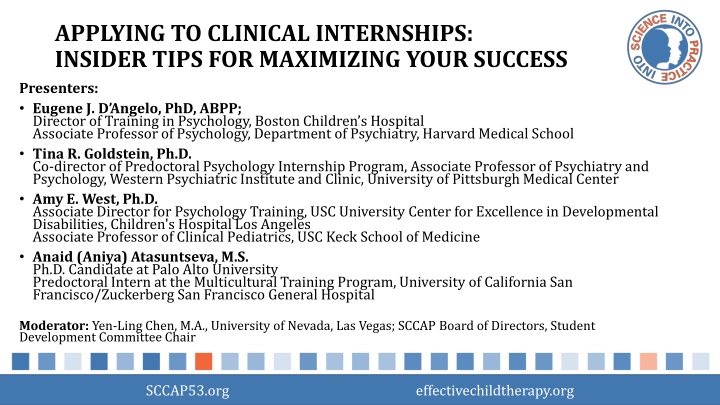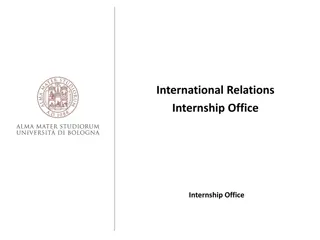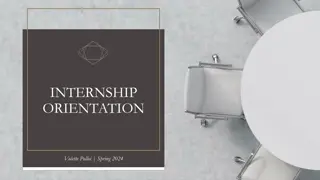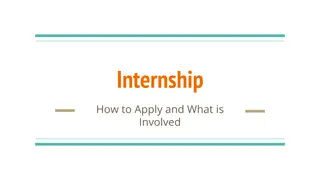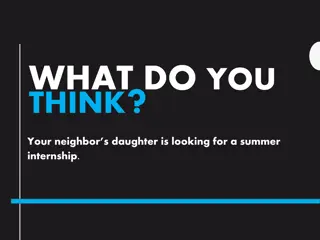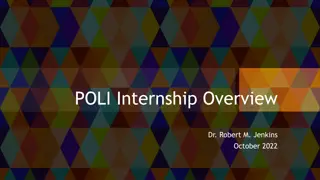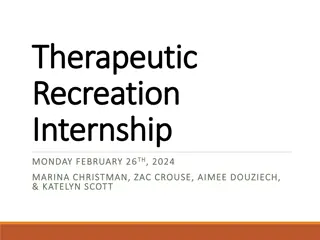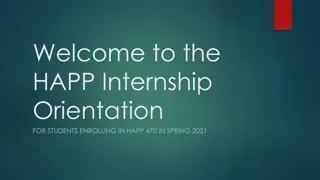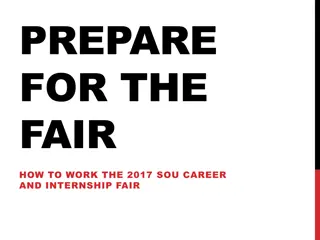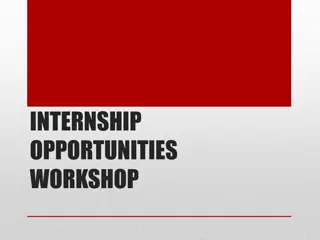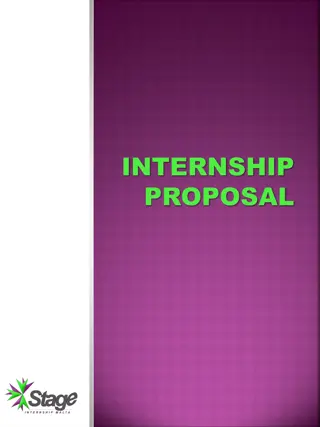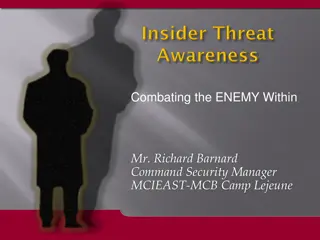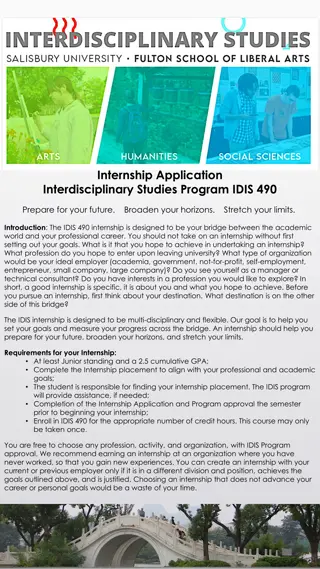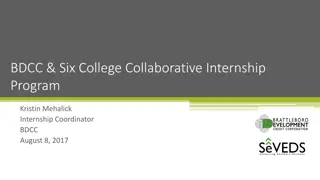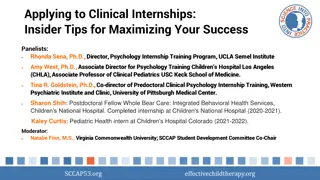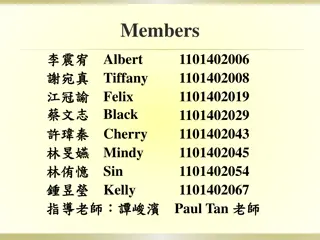Insider Tips for Clinical Internship Success
Learn insider tips from experienced presenters on maximizing your success in applying for clinical internships. Gain valuable insights and strategies to enhance your chances of securing a placement.
Download Presentation

Please find below an Image/Link to download the presentation.
The content on the website is provided AS IS for your information and personal use only. It may not be sold, licensed, or shared on other websites without obtaining consent from the author.If you encounter any issues during the download, it is possible that the publisher has removed the file from their server.
You are allowed to download the files provided on this website for personal or commercial use, subject to the condition that they are used lawfully. All files are the property of their respective owners.
The content on the website is provided AS IS for your information and personal use only. It may not be sold, licensed, or shared on other websites without obtaining consent from the author.
E N D
Presentation Transcript
APPLYING TO CLINICAL INTERNSHIPS: INSIDER TIPS FOR MAXIMIZING YOUR SUCCESS Presenters: Eugene J. D Angelo, PhD, ABPP; Director of Training in Psychology, Boston Children s Hospital Associate Professor of Psychology, Department of Psychiatry, Harvard Medical School Tina R. Goldstein, Ph.D. Co-director of Predoctoral Psychology Internship Program, Associate Professor of Psychiatry and Psychology, Western Psychiatric Institute and Clinic, University of Pittsburgh Medical Center Amy E. West, Ph.D. Associate Director for Psychology Training, USC University Center for Excellence in Developmental Disabilities, Children's Hospital Los Angeles Associate Professor of Clinical Pediatrics, USC Keck School of Medicine Anaid (Aniya) Atasuntseva, M.S. Ph.D. Candidate at Palo Alto University Predoctoral Intern at the Multicultural Training Program, University of California San Francisco/Zuckerberg San Francisco General Hospital Moderator: Yen-Ling Chen, M.A., University of Nevada, Las Vegas; SCCAP Board of Directors, Student Development Committee Chair SCCAP53.org effectivechildtherapy.org
Upcoming Webinars Submit your ideas for our 2021 Webinar Series: sccapdiv53@gmail.com Previous webinar recordings are available on https://sccap53.org/resources/education-resources/webinars/ Remaining SCCAP webinars: Sept. 11 Noon ET Children and Technology Use - Justin Parent, PhD Sept. 29 Noon ET Cannabis Use in Adolescents - Mary Fristad, PhD Nov. 4 1pm ET R. Bob Smith Excellence in Assessment Webinar: New Thoughts About Assessment and Diagnosis of Autism, Catherine Lord, PhD Free Member CE SCCAP53.org effectivechildtherapy.org
Audience Questions and Answers Submit a question during the webinar: Post your questions for the Q&A segment! On right side of screen, click on the Questions tab on the Go-To-Webinar control panel, and submit your questions SCCAP53.org effectivechildtherapy.org
Moving from Contemplation to Action in Applying for a Psychology Internship Eugene J. D Angelo, PhD, ABPP Boston Children s Hospital and Harvard Medical School Contact: eugene.dangelo@childrens.harvard.edu July 8, 2020 SCCAP53.org effectivechildtherapy.org
Disclosures 1. Support for both my teaching and research efforts come from: The Linda and Timothy O Neill Foundation The Gertrude and Jonathan Weil Foundation The Sidney Baer Foundation 2. Past Chair of the Association of Psychology Postdoctoral and Internship Centers (APPIC) Past Member, Commission on Accreditation, American Psychological Association (CoA) The opinions I express during this presentation are my personal views and do not represent either APPIC or the CoA SCCAP53.org effectivechildtherapy.org
The Internship Application Process Consideration Application Deliberation SCCAP53.org effectivechildtherapy.org
The Association of Psychology Postdoctoral and Internship Website and the Directory are a Wealth of Free Information to Assist in Your Evaluation of Programs www.appic.org SCCAP53.org effectivechildtherapy.org
Match Statistics Provided on APPIC website In Phases I and II of the 2020-2021 Match: 3761 individuals submitted rankings 3612 individuals (96%) matched 147 individuals (4%) did not match 261 positions in internship programs remained unfilled SCCAP53.org effectivechildtherapy.org
Consideration 1: Accredited vs. Non- accredited internship From the APPIC Match Statistics for 2020-2021: 3406 accredited positions were filled (97%) 114 accredited positions were unfilled (3%) 206 non-accredited positions were filled (58%) 147 non-accredited positions were unfilled (42%) SCCAP53.org effectivechildtherapy.org
Consideration 2: What type of internship program do you want to attend? Mean Class Size for Accredited Programs by Internship Program Type SCCAP53.org effectivechildtherapy.org
Consideration 3: Where do you want to reside during internship? Derived From APPIC Directory SCCAP53.org effectivechildtherapy.org
Consideration #4: Check the Internship Brochure and Website for the Potential Programs Information is provided about size of internship class, training faculty Stipend and benefits Internship Application Requirements -Minimum intervention and assessment hours -Years of graduate school education -Types of doctoral programs preferred - Types of degrees accepted/preferred Description of the program and training experience SCCAP53.org effectivechildtherapy.org
From Consideration to Deliberation Discuss the list with your advisor or Director of Clinical Training (DCT) -How much does the advisor know about the program? -How recent is the information? Speak with psychologists and/or other graduate students who may have interviewed or interned at the site for their perspective. Attend internship discussion groups and/or informational programming at regional or national conferences (eg, APA, ABCT, SPP, APAGS, state association meetings, etc) Seek candid feedback from trusted advisors about your proposed plans for internship applications SCCAP53.org effectivechildtherapy.org
APPIC Surveys of Internship Training Directors Top 6 factors for ranking interns: 1. Fit between candidate s experiences/goals and the internship program 2. Interview 3. Experience with clinical population 4. AAPI essays 5. Letters of recommendation 6. Multicultural sensitivity SCCAP53.org effectivechildtherapy.org
From Deliberation to Application Confirm your list with your mentor/advisor Allow sufficient time to request letters of recommendation from faculty and/or supervisors Fill in the AAPI Online honestly Check applications for completeness and accuracy Determine whether an interview can be scheduled virtually Mean number of applications submitted by candidates in 2020-2021: 15.4 Thank you for your attention!!! SCCAP53.org effectivechildtherapy.org
Internship Application Materials Amy E. West, Ph.D. Internship Training Director University of Southern California/Children s Hospital Los Angeles SCCAP53.org effectivechildtherapy.org
Most Important! CV Personal Statement Cover letter SCCAP53.org effectivechildtherapy.org
The Curriculum Vitae SCCAP53.org effectivechildtherapy.org
CV Tips -- Do Tailor it to the type of internship (e.g., clinical vs. clinical science) Describe awards Describe responsibilities for practica and research projects Publications be clear about published vs. in press or under review, and peer review vs. non- peer review PROOF it! (the importance of this cannot be overstated) Make it easy to read and visually appealing Use bolding, caps, font, etc. to make it easy on the eye and highlight important parts. Include spaces! Be concise, consistent with tenses and style, good grammar; use active voice; use psychological jargon cautiously Ask peers and mentors for examples Include volunteer service (will speak to your character) SCCAP53.org effectivechildtherapy.org
CV Tips Dont Don t pad it Don t include courses you took or conferences/workshops attended (with no presentation) Leave off undergraduate accomplishments unless really impressive (Rhodes scholar) Don t get too personal Leave off hobbies, marital status, children, other jobs not relevant to psychology Don t worry about length there are no rules Don t try to be cute or humorous SCCAP53.org effectivechildtherapy.org
Vita Checklist Name and contact information: work, home, address, phone, email Education, including degrees, places, and dates Dissertation topic, advisor Licenses/certifications Honors, scholarships, fellowship, or awards Professional Experience Teaching, research, or clinical experience Publications Professional or academic presentations Professional organization memberships Volunteer/service work SCCAP53.org effectivechildtherapy.org
Personal Statement SCCAP53.org effectivechildtherapy.org
Basic Structure What are your short and long term professional goals? Immediate, 5-10 year and ultimate long term plans? How did these goals develop? Specific or personal challenge? How have you already begun to lay the foundation for these goals? Activities? How does this internship fit into these goals? Skills and knowledge? SCCAP53.org effectivechildtherapy.org
Personal Statement - Do Define a central idea Tell the story (what happened) Tell what you learned (what you got out of it) Tell how what you learned applies to success in [the internship] (why it matters) Highlight your strong points; include interests and goals Be truthful Write from the heart Be positive but avoid excessively altruistic statements (e.g., I just want to help people. ). SCCAP53.org effectivechildtherapy.org
Personal Statement Dont Quote other people Use clich s Use altiloquent vocabulary Negative comments and excuses Be too candid. For example, avoid references to your mental health. Avoid providing excessively self-revealing information Use inappropriate humor, attempts to appear cute or clever, and references to religious issues or politics Adapted from: http://users.clas.ufl.edu/msscha/psych/personal_statement.html https://psych.iupui.edu/sites/default/files/guidetowritingapersonalstatement_1.pdf SCCAP53.org effectivechildtherapy.org
Cover Letter SCCAP53.org effectivechildtherapy.org
Basics Cover letters are 1-2 page documents Introduce yourself to the program director Argue why you would be a good fit for the internship Fill in places your curriculum vitae cannot describe Further explain other aspects of your curriculum vitae APA emphasizes that you should: Show you are a good fit Get past the gatekeepers Customize Mind the details Don't get too personal SCCAP53.org effectivechildtherapy.org
Cover letter Structure Opening paragraph: Clearly state why you are writing. Give a brief introduction of yourself and your status, e.g. I am completing my PhD in [department or field] and I expect to finish [or defend, or graduate] in [Month, Year]. You could add to this sentence, the name of your dissertation or the topic of your research, as well as the name of your advisor. Middle paragraphs: You should have several paragraphs that elaborate on how your research and other experiences in graduate school that have prepared you for the internship as it is described. Describe how your research and clinical activities have led you here. In order to stand out from the potentially long list of applicants, you will need to make a coherent argument for why you are a good fit. What kind of contribution will you make to their program? How will you fit in? Make sure you are writing for your target audience. Closing paragraph: Indicate that your CV and other supporting documentation are enclosed. Express interest in speaking with the addressee further in a personal interview. Thank them for their time and consideration. SCCAP53.org effectivechildtherapy.org
Cover Letter -- Do Address the specific internship materials Speak to the specific needs of the organization Highlight key words from the materials Show your passion Keep the letter concise Focus on demonstrating match Thank your reader Proofread! SCCAP53.org effectivechildtherapy.org
Cover letter Dont Reiterate your curriculum vitae Have a boring opening statement Ramble Use jargon Underestimate the importance of a good cover letter SCCAP53.org effectivechildtherapy.org
Interviewing for Internship Tina Goldstein PhD Co-Director, Predoctoral Psychology Internship Program Western Psychiatric Hospital, University of Pittsburgh Medical Center SSCAP Internship Webinar July 8, 2020 Western Psychiatric Hospital
Its all about the FIT! What kind of career is this site preparing interns for? How does the site fit with your own career goals? Consider the environmental culture and the individuals you meet
The Interview: Basics Be yourself Stay calm Present yourself professionally Convey (genuine) enthusiasm We want to know you! The best interviews are conversations ( and don t forget that they re still interviews) Practice! (really, practice)
The Interview: Tips for Preparing Do your homework! Know the site tracks rotations size sites requirements timeframe Ask informed questions (come prepared with questions ) Take notes afterward Thank you notes / emails
The Interview: Commonly Asked Questions General Why are you interested in this site? What can you bring to this internship? What are your long-term career goals? Where do you see yourself in 2/5/10 years post-internship? Clinical Describe a recent clinical case that went well. Describe a clinical case that presented a challenge for you. Research Tell me about your dissertation. Where does research fit into your career aspirations? Who would you be interested in working with on research here?
Questions for Current Interns at the Site What is a typical work day like? What are the expectations for billable/supervision hours? How does your experience match with what you expected? What is your experience with faculty/supervisors/trainees? What are the program's strengths and weaknesses? To what extent do you feel supported? What is it like living in [CITY]?
Thank you! I welcome your questions
Applying for Internships: A Student Perspective Anaid (Aniya) Atasuntseva, M.S. Predoctoral Intern, Multicultural Training Program (MCTP) University of California, San Francisco/ Zuckerberg San Francisco General Hospital Postdoctoral Fellowship, Adolescent DBT Program, Stanford University SCCAP53.org effectivechildtherapy.org
Applying for Internships: A Student Perspective My background: Clinical Psychology Ph.D. from Palo Alto University (t-minus 6 weeks) Clinical interests: Emotion Regulation/ Anxiety; underserved children/adolescents Research interests: Consumer-Centric research with the goal of addressing barriers to accessibility of evidence-based practices in marginalized youth Major clinical experiences: 1 year practicum at a community mental health agency providing outpatient therapy to children and adults 1 year practicum at community mental health agency providing outpatient therapy and assessment to children and adults as well as outpatient therapy in a K-6 school. 1 year practicum at specialty DBT-informed Intensive Outpatient Program providing individual, group, family therapy and assessment in an outpatient hospital setting. Applied in Fall 2018 to evidence-based community mental health agencies and academic medical centers with Child/Adolescent tracks with a focus in interdisciplinary treatment Matched to MCTP at UCSF/ZSFGH, a large community mental health agency within an academic medical center in SF SCCAP53.org effectivechildtherapy.org
Big Picture 1. Fit is real, and it is important! 2. Take care of yourself 3. It s only one year . And 4. This is just as much an opportunity for them to get to know you as it is for you to get to know them 5. Second Match is not the end of the world SCCAP53.org effectivechildtherapy.org
Application Tips Start early! Like NOW Deciding on what site to apply to Brainstorming your goals before searching for sites What do you want more training in? What are the gaps you want to fill? Location can be a factor but it shouldn t be the only factor If you are geographically restricted on where you can apply, be flexible on other aspects and apply to more sites Have a good mix of sites: Red, Yellow, Green Start a spreadsheet to organize info about sites, application requirements Consider budget for application & interviews. Don t apply to a million just because Ask everyone you know who was a similar applicant to you to share their site lists SCCAP53.org effectivechildtherapy.org
Application Tips Essays Revise, Revise, Revise Multiple readers Tailor towards type of site Cover Letters Showcase your fit Not just about what you can offer, what can you learn? Be as specific as possible Unique letters are necessary but you can have a template for each type of site SCCAP53.org effectivechildtherapy.org
Interview Tips Create a Calendar with all possible interview dates Practice! Check email regularly and have phone handy for interview offers Schedule strategically Interview in December if Possible Leave minimum one day between trips to account for weather Spend time in the region and get to know your location Use your cover letter as your study guide and make a list of quick facts from the brochure to review before Take detailed notes after interviewing at each site or audio record your thoughts SCCAP53.org effectivechildtherapy.org
Interview Tips Prepare for both structured and unstructured interviews Have generic and site-specific questions to ask Send thank-you emails Talk to other interviewees to give you a sense of your fit with the site Take advantage of time with current interns Ask about: Hours, Telehealth options, Day-to-day schedules Support for professional development What they wish they had known Get their email addresses for follow-up Qs Give your sites numerical rankings based on your own categories Rank with your gut SCCAP53.org effectivechildtherapy.org
COVID Caveat A lot of interviews may be virtual, prepare for both options If you can/ feel comfortable visit the site in person Get a sense of what it was like for the current interns Did they do telehealth? Where they able to get their hours? Leave policies? Take COVID into account at all steps SCCAP53.org effectivechildtherapy.org
Thank you for participating Still have questions? Please post them on the SCCAP Listserv to continue the community discussion div53@lists.apa.org SCCAP53.org effectivechildtherapy.org
Source Citation for this Presentation With website link D Angelo,E.J., Goldstein,T.R., West,A.E., Atasuntseva,A.,(2020) Applying To Clinical Internships: Insider Tips For Maximizing Your Success[PowerPoint slides]. Retrieved from https://sccap53.org/resources/education-resources/webinars/recordedwebinars/ Without website link D Angelo,E.J., Goldstein,T.R., West,A.E., Atasuntseva,A.,(2020) Applying To Clinical Internships: Insider Tips For Maximizing Your [PowerPoint slides]. Webinar sponsored by the Society of Clinical Child and Adolescent Psychology, Division 53 of the American Psychological Association. New York, NY. SCCAP53.org effectivechildtherapy.org
Eugene DAngelo Tina Goldstein Amy West Aniya Atasuntseva Yen-Ling Chen
Technical Issues The webinar will be recorded and made available on SCCAP53.org. If technical sound issues arise, we will: 1. Change from live stream images of the presenters to a placeholder slide. 2. If audio issues continue, we will request participants submit their questions and to sign-off of the webinar. The panelist will continue to answer these questions on a recording. The recording will be edited and made available on SCCAP53.org SCCAP53.org effectivechildtherapy.org
